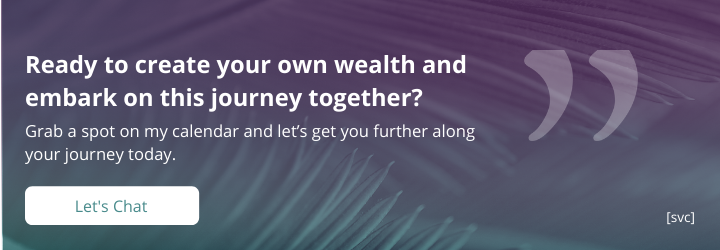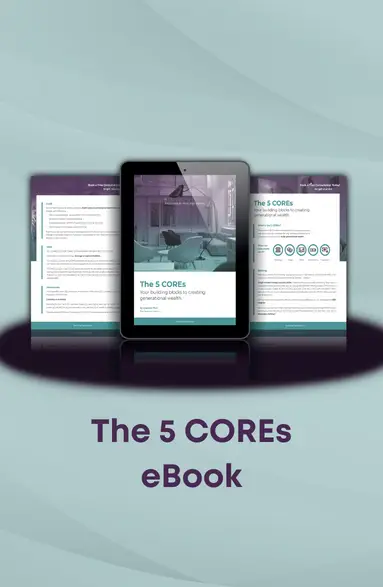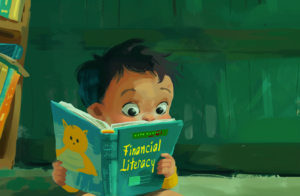Most of my students fear debt. They see it as this evil thing that is just holding them back from getting ahead in life.
But there’s usually a deeper level of emotional association that we tie to our debts, one that is often buried or swept under the rug, never to be looked at.
And therein lies the dilemma.
Remember when I talked about how we all have a relationship with money? Well, this is one of the scenarios where it comes into play. If you’re an entrepreneur, think about your relationship with money as the equivalent of having a vision of your business. Without a vision, you’re blindly taking action. But with a strong purpose and a clear vision, you know exactly what actions you need to be able to take to reach your goals. Let’s get into it.
What is debt?
Debt is simply money or assets that you owe. Nothing more, nothing less.
It can come from reckless spending, emergencies, borrowed money – honestly, it can be from anything. There are no positive or negative connotations to debt except for the ones you impose onto yourself.

But I’d like to challenge you for a moment. What are your thoughts when you hear the word ‘debt’? Do you tense up? Is there a sense of guilt, wrongdoing or shame even? Be honest with yourself. It’s not like you have to share these answers to the world, but if you want to step outside of those emotions, regain power, have peace of mind… It starts with being honest with yourself about how you feel about debt.
There was a joke that was thrown a lot back when I was in junior high: in order to fix the problem, you have to first admit you have a problem. So the kids would all say “it’s okay, Queenie. Remember, step one is to say “I have a problem.”
Although it was used in teasing me and each other, there’s actually a lot of strength in acknowledging our own problems. Little did we know at the time that we were actually onto something big! Because guess what, we all have problems. It’s what makes life, well… Life. If you have a problem with the world problem, reframe it. It’s simply “what’s so” – what’s currently going on right now. It doesn’t say anything more or less about you except for the emotions you associate with it.
Emotions you associate with your debt.
So now that you’ve had a moment to think about what emotions you associate with debt, what’s next?
Step 1: Forgive yourself. Whatever it is, you’re NOT at fault. Even if you went on a reckless spending shopping spree. The thing is, money IS emotional.
Too many gurus and experts tell you to leave emotions at the door but that’s simply just NOT how we function as human beings. Our emotions guide us – and how do we guide our emotions when it comes to money? We have to first look inward to our own relationship with money. Heal from within sort of speak.
If you haven’t noticed, the approach to wealth in terms of money is both spiritual AND holistic. It’s a practice. So here comes your choice. You can choose to embrace, heal, and move on OR you can hoard onto your feelings and stay right where you are. The choice really is yours.
Remember, it’s not about how much money you have, but rather what you do with it that makes the difference. If you are still stuck but see a possibility for yourself to change, reach out to our team, we can help you cross that bridge together.
Clarity vs Blind Action

When we don’t know something, we tend to call upon those who are more experienced and turn to the gurus. But there are also a lot of broke gurus and experts. Some will tell you to invest money into tech stocks, some will tell you that bonds are safe, others will preach that building a business is the right way to go.
But very rarely do people tell you that YOU can choose which path to go for yourself! This irritates me. Why do we tell people that “anyone can start a business” but not “anyone can take control of their own finances”? This is a PERSONAL choice, why shouldn’t you be the one in the driver seat making that choice for yourself?
We tend to take blind action because we think it’s better than not doing anything at all. I mean, in the case of compound interest that may be true, but why don’t the “gurus” and “experts” give YOU the permission to make your own choice? Likely because they might be out of a job if that were the case. But isn’t that what you do, Queenie? Teach people?
I do. However, the principles that I’m teaching can all be found within my free content/resources. Whether that’s in this book, my blogs, videos, or Facebook group. The information I’m sharing isn’t any different than the ones I teach in my programs, they’re simply expanded upon. People don’t pay me for the solution. They invest in me for clarity & implementation. Because it’s one thing to know what to do, and it’s a whole other scenario to actually take those actions for yourself. I help my students lay their foundation of wealth together. But they don’t “need” me – they choose to work with me because they want a partner in their corner, and THAT is what I provide.
Information is great, but you also need to know how to put all the pieces together. And I’m telling you that YOU CAN DO IT. So whether you’re going to hire a coach or tackle this on your own, make sure that you have a clear goal of where you want to go.
Now go forth and create your own vision and journey!
Building Your Roadmap
Once you’re clear on what you want to create, your next step is to have a roadmap that will help get you there. If you haven’t already done so, make sure you prioritize your financial goals. Likely not all goals were created equal, for example if you want to get out of debt, you likely want to focus more on that as opposed to going 100% full force on investing.
Here’s the slight math on why that is, especially if you’ve got some bad debt (consumer debt such as credit cards). Your interest is likely sitting around 18-21% per month and, unless you’re an expert in the stock market, you likely won’t get those returns which means you’re really not getting ahead of your goals or your debt.
Now, it’s incredibly hard to generalize a roadmap because our situations are all unique but there are components that we can incorporate, so let’s get into those.
- Set Milestones
- Break it down
- Celebrations
First and foremost you have to make sure that any goal you set is measurable. One way to do that is to set milestones for yourself. Think of this as your check in, or north compass – it helps you stay the course and keep you on track if you stray from your goals.
Next is to break down your goals! There’s a saying that people tend to overestimate what they can achieve in one year but underestimate what we can achieve in 10 years. Moral of the story? Break down your goals into smaller chunks, this will help you stay motivated as well as making it more digestible in the event that life comes up – which by the way, it always will.
Lastly, set celebrations for yourself. For each milestone or each part of the goal, because the truth is, you deserve it! Life is never about the end goal or destination because, quite frankly, the end journey of all our journeys is our graves. (Morbid, I know but I’m a philosopher lover and the study of philosophy includes being okay with your death).
Focus on the journey, your mistakes, your wins, and celebrate ALL of them. Wealth is about becoming, it’s not a checklist of to dos. So remember to celebrate all parts of your life. And know that your choices don’t define you – they’re simply choices you’ve made and you can always choose to do something else. Give yourself the permission to do so.
Now go kick some ass!







